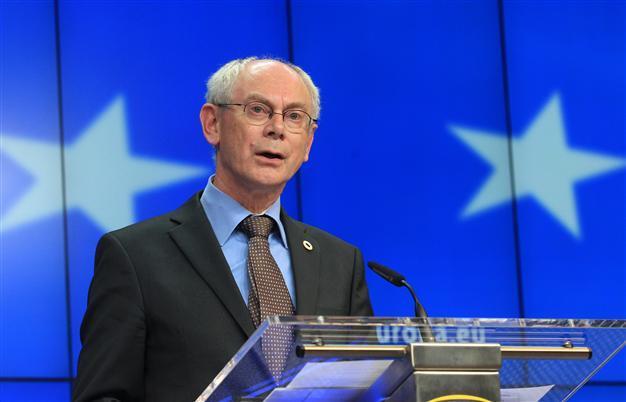EU to review policy priorities after vote setback
BRUSSELS - Agence France-Presse

European Council President Herman Van Rompuy addresses the media at the European Council building in Brussels, Tuesday, May 27, 2014. AP Photo
European Union leaders agreed Tuesday to take a fresh look at the bloc's policy priorities, after a stinging vote setback across Europe that saw dramatic gains by radical anti-establishment parties.
Meeting for a post-mortem summit in the wake of the dismal European Parliament election results, the bloc's 28 national leaders gave European Council chairman Herman Van Rompuy a mandate to fine-tune policy goals on issues from jobs to energy.
Van Rompuy's conclusions after bilateral talks with governments and meetings with parliamentarians will be put to another EU summit in late June.
"Voters sent a strong message," Van Rompuy told a news conference
He said that now that Europe was emerging from economic crisis, there was a need for an agenda of growth, jobs and competitiveness.
He also stressed that "a strong response" was needed to the climate change challenge and "a push" towards energy union and to lessen energy dependency.
On arriving for the talks, British Prime Minister David Cameron, faced with a historic eurosceptic surge at home, said "the EU has got too big, too bossy, too interfering and needs to concentrate on growth and jobs."
France's President Francois Hollande, who also suffered a thrashing at the hands of the far-right National Front (FN), urged fellow Europeans to "take heed of what happened in France."
The FN topped the vote and left Hollande's ruling Socialists in third place with a mere 14 percent.
Final results of the four-day vote are yet to come but estimates show anti-EU parties winning between 20 and 25 percent, leaving the mainstream parties still wielding a comfortable majority.
Also on the leaders' dinner menu -- and perhaps just as difficult to digest -- were tough talks on choosing new leaders for the various Brussels bureaucracies, in particular the presidency of the powerful European Commission.
Cameron, Hungary's Viktor Orban and Sweden's Fredrik Reinfeldt publicly differed with others support for the candidate of the European Parliament's conservatives -- ex-Luxembourg premier Jean-Claude Juncker.
The conservatives are set to be the single largest group in the next 751-seat EU parliament, but they will not enjoy an overall majority.
Van Rompuy is to discuss the issue with governments and with the parliament's new political groups once they are set up in the coming weeks.
The European Parliamentary elections, which rolled across the 28-nation EU over four days last week, served up a clear message of voters fed up with economic distress, belt-tightening austerity, immigration and, most of all, aloof and meddlesome bureaucrats in Brussels.
After decades of striving to tighten EU integration with "more Europe", many Europeans seem to believe that is no longer the answer.
Cameron, who has one eye on national elections next year, saw anti-EU outsider, the UK Independence Party (UKIP), make history by topping the poll in Britain.
Projections give the conserv ative European People's Party (EPP) 213 seats out of 751, with the Socialists on 190 and the Liberals 64.
That will give the centre-right, centre-left and Liberals a solid working majority.
But the eurosceptics, xenophobes and even outright fascists about to sit in parliament and win EU funding, along with radical left groups, will gain a platform for their views as well as scope to slow down the assembly's legislative process.
The anti-EU camp will have about 140 seats though analysts say it will be difficult for the disparate groups to operate in a coherent fashion.
The summer meanwhile will see all the EU's top officials replaced, beginning with a new president of the Commission, the EU's executive arm which proposes and enforces laws.
In previous years, this was the entire prerogative of the bloc's national leaders, with names discussed among themselves behind closed doors.
But the latest rules in the EU bible, set down in the Lisbon Treaty, state somewhat ambiguously that they must "take into account" the people's voice expressed via the election results.
On that basis, the five main parliament groups elected their own candidates for Commission president, sent them out on the campaign trail and warned they fully expected EU leaders to name one of them to the post.
As Parliament is the EU's only directly elected body, they argue, this would be the best way to bolster the bloc's democratic credibility.
On Tuesday, European Parliament party leaders agreed to back Juncker as Commission president as the EPP topped the vote.
Should he fail to put together a 376-seat majority in parliament then the task could fall to Martin Schulz of the second-placed Socialists.
A refusal by the national leaders to accept the Parliament's candidates could lead to an institutional crisis.
"Our point is that there's no automatic connection between the outcome of the election and the nomination," said Hungary's Orban.
